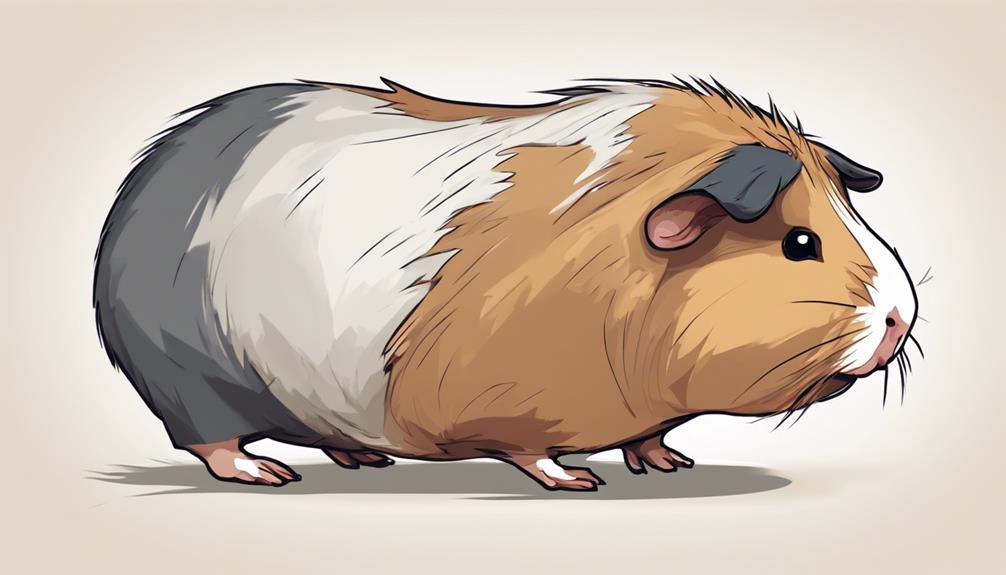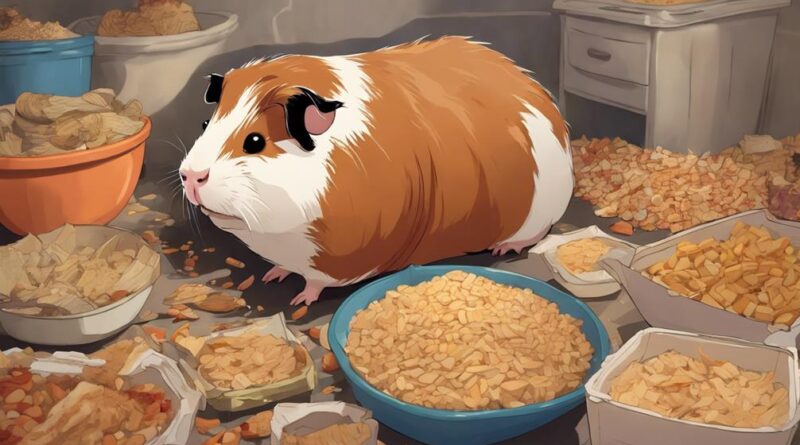Risks of Overfeeding Your Guinea Pigs Explored
When it comes to caring for your guinea pigs, providing them with the right amount of food is crucial.
Overfeeding your guinea pigs can lead to various health risks that you may not have considered. Obesity in guinea pigs is just the tip of the iceberg; it can trigger a domino effect of issues that can impact your pets' well-being in unexpected ways.
From digestive complications to behavioral changes, the consequences of overfeeding go beyond just a full belly.
Stay tuned to uncover the hidden risks associated with this seemingly harmless act of kindness.
Obesity in Guinea Pigs
Overfeeding guinea pigs can lead to obesity, causing serious health issues for these small pets. Weight management is crucial to ensure the well-being of your furry friends. Just like humans, guinea pigs require a balance of a healthier diet and exercise routines to maintain a proper weight and overall health.
Healthier diet choices play a significant role in preventing obesity in guinea pigs. Opt for high-quality guinea pig pellets that are specifically formulated to meet their nutritional needs. Additionally, supplement their diet with fresh hay and vegetables, but remember to practice portion control. Overfeeding on treats or high-calorie foods can quickly lead to weight gain and obesity.
Incorporating exercise routines into your guinea pigs' daily life is essential. Providing them with ample space to move around, such as a spacious enclosure or a safe play area, encourages physical activity. You can also introduce interactive toys or tunnels to stimulate their natural instincts to explore and stay active.
Monitoring your guinea pigs' weight regularly is key to managing their health effectively. If you notice any signs of obesity, such as difficulty moving or breathing, consult a veterinarian for guidance on adjusting their diet and exercise routine. By prioritizing weight management, healthier diet choices, and exercise, you can help your guinea pigs maintain a healthy weight and lead a happy, active life.
Digestive Issues
Digestive issues can arise in guinea pigs due to imbalances in their diet or stress factors. Ensuring proper weight management through dietary restrictions is crucial for your guinea pig's gut health. Overfeeding can lead to digestive problems such as diarrhea, bloating, and even more severe conditions like gastrointestinal stasis.
To maintain optimal gut health in your guinea pig, focus on portion control. Provide a balanced diet rich in hay, fresh vegetables, limited fruits, and quality pellets. Avoid overindulging your guinea pig with treats high in sugar or fat, as these can disrupt their digestive system.
If your guinea pig is experiencing digestive issues, consult a veterinarian promptly. They may recommend dietary adjustments, probiotics, or medications to help regulate their digestion. It's important to address these problems early on to prevent more severe complications.
In addition to diet, stress factors like sudden changes in environment or loud noises can also impact your guinea pig's digestion. Creating a calm and secure living space for your pet can help reduce their stress levels and support their overall well-being.
Dental Problems
Ensuring proper dental care is essential for your guinea pig's overall health and well-being. Neglecting your guinea pig's dental health can lead to serious issues such as tooth decay and gum disease. These problems can cause pain, difficulty eating, and even lead to more severe health complications if left untreated. Here are some key points to consider regarding dental problems in guinea pigs:
- Regular Dental Check-ups: Just like humans, guinea pigs need regular dental check-ups to detect any issues early on.
- Chew Toys: Providing chew toys can help keep your guinea pig's teeth worn down and healthy.
- Proper Diet: A balanced diet with enough hay is crucial for maintaining good dental health.
- Watch for Signs: Keep an eye out for signs of dental problems such as drooling, weight loss, or a decrease in appetite.
Nutrient Imbalance
Proper nutrition plays a crucial role in maintaining your guinea pig's health, including preventing nutrient imbalance which can have serious consequences. Guinea pigs have specific dietary requirements to stay healthy. Nutrient imbalance can occur when there's either an excess or a deficiency of certain nutrients in your guinea pig's diet.
Ensuring that your guinea pig's nutritional needs are met is essential for their well-being. Imbalances in key nutrients like Vitamin C, calcium, and phosphorus can lead to various health consequences. For instance, if your guinea pig doesn't receive enough Vitamin C, they can develop scurvy, a condition that can cause weakness, swollen joints, and even death. On the other hand, an excess of calcium can result in bladder stones, which are painful for your pet and may require veterinary intervention.
Monitoring your guinea pig's feeding habits is crucial in preventing nutrient imbalance. Providing a balanced diet that includes fresh hay, vegetables, and a limited amount of commercial guinea pig pellets can help meet their nutritional requirements. Avoid overfeeding certain foods high in sugar or calcium, as this can disrupt the delicate balance of nutrients in your guinea pig's body.
Decreased Lifespan
A significant consequence of overfeeding your guinea pig is a shortened lifespan due to the strain on their vital organs. When guinea pigs are consistently overfed, it leads to various health issues that can significantly impact their longevity.
- Organ Strain: Excess food puts a burden on your guinea pig's vital organs, such as the heart and liver, leading to decreased functionality and potential organ failure.
- Decreased Activity: Weight gain from overfeeding can cause your guinea pig to become lethargic and less inclined to engage in physical activities, which are essential for their overall health.
- Cardiovascular Problems: The extra weight gained from overfeeding can put pressure on the cardiovascular system, increasing the risk of heart-related issues and impacting their lifespan.
- Digestive Complications: Overfeeding can lead to digestive problems like bloating, constipation, and gastrointestinal disturbances, which can affect nutrient absorption and overall well-being.
Behavioral Changes
Overfeeding your guinea pig can lead to not only physical health issues but also significant behavioral changes that affect their overall well-being. When guinea pigs are overfed, they may exhibit stress indicators such as increased restlessness, teeth chattering, and excessive grooming. These behaviors are their way of communicating discomfort or unease due to the excess food intake.
Moreover, overfeeding can disrupt your guinea pig's social interactions. Normally, guinea pigs are social animals that enjoy the company of their fellow cage mates. However, when overfed, they might become irritable, aggressive, or withdrawn. This change in behavior can lead to conflicts within the group, affecting the overall harmony of the enclosure.
To prevent these behavioral changes, it's crucial to provide your guinea pig with a balanced diet and proper portion control. Monitoring their food intake and ensuring they've enough space for exercise and social interactions are essential for their well-being. By maintaining a healthy diet and environment, you can help your guinea pigs thrive both physically and socially. Remember, a happy guinea pig is a healthy guinea pig.
Joint and Mobility Problems

What impact can overfeeding your guinea pig have on their joints and mobility?
When guinea pigs are overfed, it can lead to several issues related to their joints and mobility. Here are some key points to consider:
- Joint Pain: Excess weight due to overfeeding can put strain on your guinea pig's joints, leading to pain and discomfort.
- Arthritis Risk: Overfeeding can increase the risk of arthritis in guinea pigs, causing stiffness and reduced mobility.
- Decreased Activity: When guinea pigs are overweight, they're less likely to engage in physical activities, further exacerbating joint problems.
- Difficulty Moving: Overfed guinea pigs may find it challenging to move around freely, affecting their overall well-being.
To mitigate these issues, consider the following recommendations:
- Exercise Options: Provide ample opportunities for your guinea pig to exercise by offering a spacious enclosure with toys and tunnels for stimulation.
- Dietary Adjustments: Consult with a veterinarian to create a well-balanced diet that meets your guinea pig's nutritional needs without overfeeding them.
Increased Veterinary Costs
When your guinea pig's health is compromised due to overfeeding, you may find yourself facing increased veterinary costs. Weight management plays a crucial role in maintaining your guinea pig's overall health and wellbeing. Overfeeding can lead to obesity in guinea pigs, which not only affects their quality of life but also puts them at risk for various health issues, ultimately resulting in higher veterinary expenses.
Obese guinea pigs are more prone to developing conditions such as diabetes, heart disease, and joint problems. These health issues may require frequent visits to the veterinarian for monitoring, treatment, and medication. Additionally, if your guinea pig's weight gain is causing mobility issues, specialized care and interventions may be needed, adding to the overall veterinary expenses.
Furthermore, overweight guinea pigs are at a higher risk during surgical procedures, as the excess weight can complicate anesthesia and recovery. In such cases, veterinary expenses can skyrocket due to the need for extra precautions and post-operative care. By practicing proper weight management through a balanced diet and regular exercise, you can help prevent obesity in your guinea pig and reduce the likelihood of incurring substantial veterinary costs associated with overfeeding. Remember, a healthy guinea pig is a happy guinea pig, and a happy guinea pig can lead to lower veterinary expenses in the long run.
Frequently Asked Questions
Can Guinea Pigs Actually Die From Overfeeding?
Yes, guinea pigs can actually die from overfeeding. Health risks associated with overfeeding include obesity, digestive issues, and even potential organ failure. To prevent this, ensure a balanced diet and proper portion control.
Incorporate exercise into their routine to maintain a healthy weight. Monitoring their food intake and providing a suitable environment for activity are key in keeping your guinea pigs healthy and happy.
How Can I Tell if My Guinea Pig Is Overweight?
To manage your guinea pig's weight effectively, focus on diet control and portion sizes. Keep track of how much food they eat daily and adjust accordingly. Encourage exercise by providing ample space for movement and play.
Regularly check their body shape and feel for excess fat over the ribs and spine. Consult with a vet for guidance on weight management strategies tailored to your guinea pig's specific needs.
Are Certain Breeds of Guinea Pigs More Prone to Overfeeding Issues?
Certain breeds of guinea pigs may have tendencies towards overeating, leading to health issues. It's essential to be aware of your guinea pig's breed's specific needs and potential risks of overfeeding.
Take dietary precautions by providing balanced meals and monitoring portion sizes to prevent obesity and related health problems.
Can Guinea Pigs Develop Food Addictions or Cravings From Overfeeding?
When you overfeed guinea pigs, they can develop food addictions or cravings. This can lead to behavioral changes and addiction risks. To prevent this, it's crucial to implement dietary restrictions.
Overfeeding can cause health consequences, impacting your guinea pigs' well-being. Be mindful of their diet to avoid potential issues.
Is It Possible to Reverse the Negative Effects of Overfeeding on a Guinea Pig's Health?
If you've accidentally overfed your guinea pig, you can take steps to reverse the negative effects on their health.
Start by making dietary adjustments to ensure they receive appropriate portions of food. Slowly introduce more hay and reduce the amount of pellets to help them lose excess weight.
Regular exercise and providing fresh vegetables can also aid in getting your guinea pig back to a healthy state.
Conclusion
In conclusion, overfeeding your guinea pigs can lead to a range of health issues, from obesity and digestive problems to dental issues and behavioral changes.
It can also result in nutrient imbalances, decreased lifespan, and increased veterinary costs.
It's important to carefully monitor your guinea pigs' diet and ensure they're receiving the proper amount of food to prevent these risks and keep them healthy and happy.
